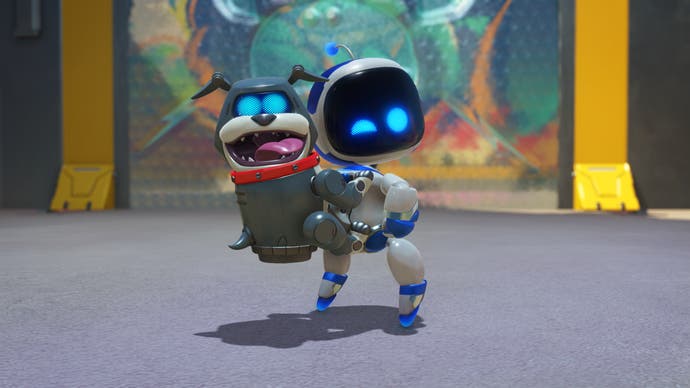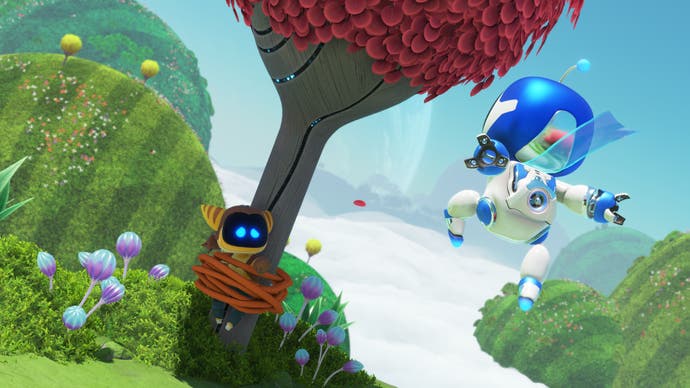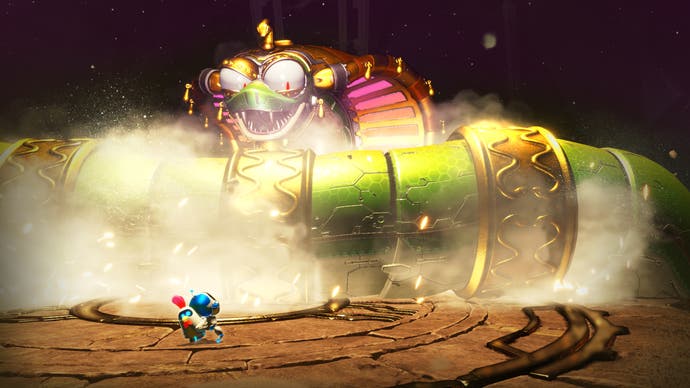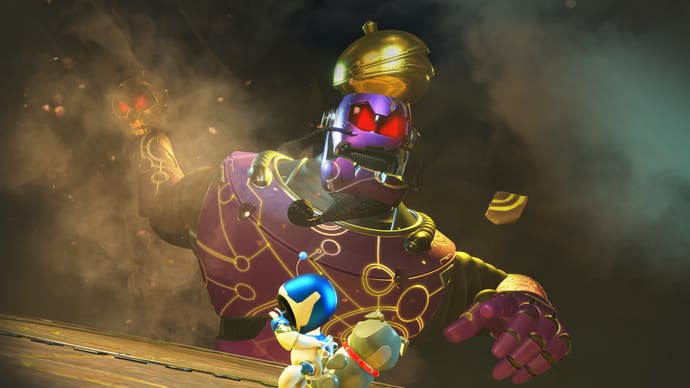Astro Bot channels the pure game design of Nintendo, as PlayStation turns towards families
"It would be a good thing if the player stopped looking for the goal and got sidetracked by chasing butterflies."
Few games generated as much joy in the room of their Summer Game Fest demos as Astro Bot, the latest from Astro's Playroom and Astro Bot: Rescue Mission developer Team Asobi. During my three quarters of an hour or so with Astro Bot I just about cleared all of its demo. I say "just about" because, while the main missions accessed from its galaxy-style menu were a family-friendly breeze, a couple of other hidden, bonus missions were far from it, offering a challenge to rival some PlayStation platformers of old (looking at you, Crash Bandicoot).
"This level in particular," explains Nicolas Doucet, Asobi studio founder and creative director of Astro Bot, while noodling around in an early, flamingo-themed world, "we want it to be enjoyable for everyone - but potentially, for a very, very young child, we almost wanted it to be like a playground, and that would be the one thing they play."
At the same time, he continues, "we've got to think about the difficulty curve and the challenge of the whole game, which is why outside of the main path leading to the boss, you have these extra challenges - and that's where you find a lot of PlayStation characters too." One of those characters, of course, is Bloodborne's Lady Maria, something Doucet told me had "no secret meaning," despite many fans' hopes it might be some kind of hint at a much-desired Bloodborne sequel, remaster, or PC port.
Back to that playground idea though, which, as Doucet explains further, it becomes clear to me is an example of the kind of considered, design-forward thinking for which Team Asobi has begun to earn a reputation. On each level there are little items, objects, or elements of environmental design that serve no purpose other than to be fun to interact with. On that first level, for instance, petals swoosh in little pools of water, a mischievous rodent creature pops up and then hides whenever you approach it, and a diving board springs you up, high above a big pool, which contains more secrets for the more determined players who want to complete the level fully.
"When you work on these games that are very much gameplay-driven, it's almost like every single interaction is an opportunity to have a little 'toy loop'," Doucet says. "To the point where it would be a good thing if the player stopped looking for the goal of the level, but instead got sidetracked by just, you know, chasing butterflies and punching trees and flowers, just because there's a nice gameplay loop there."
Doucet describes this as a kind of "toy culture," an approach he links back to Astro's Playroom, the PS5 pack-in game that emphasised the physical aspects of PlayStation's hardware over the years - but that also loops into Doucet's earlier career in QA on Lego games, and then on the EyeToy with PlayStation's now closed London Studio. "When I went to PlayStation I expected to find a very different sort of company," he said, before realising that actually the lessons of working on Lego "translated" well. "It was very much the same kind of audience, you're trying to put games in the hands of people who have maybe never played a game in their life."

The obvious - and understandable - comparison with Astro Bot is with Nintendo games, particularly the company's 3D platformers like Super Mario Odyssey and co. But beyond the basic comparisons - the third-person mascot platforming, the jumping on enemies, coin-collecting and in this case, bespoke abilities picked up for each level - there is a genuine connection to be made. One is that emphasis on "toylike" moments, as Nintendo's often referred to in glowing terms as a "toy maker" as much as a developer or manufacturer, but there's also something noticeably Nintendo about Team Asobi itself, in its development practices and philosophy behind the scenes.
Nintendo gave a rare insight into its approach with two GDC talks earlier this year, one on the miraculous physics of The Legend of Zelda: Tears of the Kingdom, the other on generating ideas for Super Mario Bros. Wonder. From both of those, a clear lesson can be drawn from not just the general approach Nintendo has but the specifics of how it actually develops games, breaking teams up into miniature prototype groups, for instance, featuring just one person from each discipline. Or soliciting ideas on post-it notes from across the team.
Doucet had seen the Wonder talk in particular, and noted the similarities when I asked if it lined up with his approach. "We try to not have a lot of the same kinds of minds in a room at the same time," he said, "so it might be a mix of engineers and artists, maybe we bring in some audio people, animators, and together you come up with the ideas." The team then builds up a "catalogue" of ideas, much the same way as Nintendo did with Super Mario Wonder, "and literally, hundreds of ideas come out - the hard part actually is to then think, Okay, which ones to we prototype? We can't prototype them all.


Beyond that, Doucet has spoken in the past about creating an environment that gives security to its team but also, crucially, a sense of purpose and meaning. One of the ways Asobi does that is to intentionally make games that don't take as long to finish developing as the typical triple-A project, something Doucet says has "so many benefits - first of all, it means you can be doing something else with your life, which, you know, is important."
The team also works in two-week 'marathons', where they'll stop each time to all play the game at that two-week mark. "If you get stuck in a tunnel for nine months or one year, and you still don't know where it's going, it can become quite, you know… so being able to always see what the next step is, and the light at the end of that mini-tunnel, that's why we work on these two week marathons - because they give you a chance to reassess what you're doing and why you're doing it. Which is really important, right? Why do you get up every morning to work on this game? Where is it going? Why is it important? Being able to express that to the team is very, very important, because it gives meaning to why we work."
Asobi also has a somewhat unique approach to creativity. While the main development team works on building a given game, another "team B" works on the side, purely to prototype gameplay ideas - be those for new, fully-fledged future games, or just neat mechanics that might be used elsewhere. The studio is still prototyping now. "Always, on the side," Doucet says. "We always keep it going, because we know the future depends on it."

An example of this approach bearing fruit already can be seen in Astro Bot's trailer, where at one point Astro gains a power-up that turns him into a big sponge. "That particular idea was born beside Astro Bot - we had this team doing new DualSense tests, outside of the platforming." This is because, Doucet explained, if you put everyone on the main game, "of course you can come up with new ideas - but in a way, your mind is now on jumping, running and stuff, and a lot of ideas will be discarded automatically.
"We said: it doesn't matter, don't even think about what game you might come up with, just explore some cool stuff with a DualSense. And one of them was like a demo where it was just a big sponge, where you can put water [in it], and then, using the adaptive trigger, you can kind of squeeze water out of it." The demo reflected the way that, at first, the sponge would be harder to squeeze before quickly becoming lighter as water left it. "We'd never have had the idea of turning Astro into a sponge, it was that demo made outside of it that influenced [the team] and gave us the confidence."
As for my own experience with Astro Bot, that confidence is tangible. In three core levels I felt more use of the DualSense than I had in just about any other PlayStation game, in part because of the sheer simplicity of the controls. Even putting the family approachability aside - run around and you'll notice the camera does much of the following work automatically, for instance - the reduced number of inputs means the ones you do use become sharper: pulling both triggers to use a pair of extendable arms to grab something, walk back, and set Astro up like a catapult, for instance.

It is tempting to reduce Astro Bot to being another bit of PlayStation marketing, after Playroom focused so heavily on showing off its hardware alongside the PS5's launch. In fact, the developers at Team Asobi originally thought about dropping the PlayStation "coating", as Doucet puts it, before changing their mind. "The question came: 'Should we once again do a PlayStation tribute?' And a lot of the prototyping we did, and the core gameplay of this game, is actually really separated from that - it's about new power ups, and levels inspired by pop culture, and classic humour… it could have just been that.
"But then you're like, 'But why not add in that coating of PlayStation, because it was so good? I mean if we can do something that is even a step further, why not do it? So we doubled down on that, and instead of the hardware, we kind of put our attention towards the characters."
Regardless of the coating, the result from the demo I played so far is one of the most joyful experiences of Summer Game Fest. Alongside Lego Horizon Adventures, another cheery, drop-in, drop-out family game, it's also a marked shift for PlayStation - moving from their solemn, "sad dad" action epics towards games that are not only family-friendly but also a little less self-serious, poking fun at themselves and taking a lighter approach towards the platform as a whole. It's a welcome shift - towards the pure design of the platformer genre and, with it, the pure joy that genre can elicit.
"Of course Astro is also a gamer's game, we want to make sure that we fulfil both of these audiences," Doucet says, later on in our conversation. "But then also, it is going to be the first game for maybe a lot of kids out there, and so that responsibility is really a big one. But it's also really exciting, because as a gamer you have your first memories, you have [your first] games - and the people who made those games really shaped your life, right?" As potential first experiences of modern gaming go, I couldn't think of too many better.









